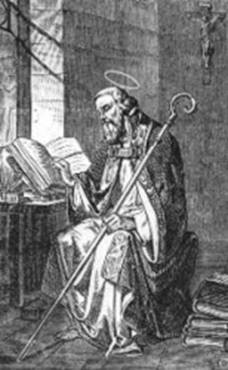
“They didn’t know who they were.” This is how Hilary summed up the problem with the Arian heretics of the fourth century.
Hilary, on the other hand, knew very well who he was — a child of a loving God who had inherited eternal life through belief in the Son of God. He hadn’t been raised as a Christian but he had felt a wonder at the gift of life and a desire to find out the meaning of that gift. He first discarded the approach of many people who around him, who believed the purpose of life was only to satisfy desires. He knew he wasn’t a beast grazing in a pasture. The philosophers agreed with him. Human beings should rise above desires and live a life of virtue, they said. But Hilary could see in his own heart that humans were meant for even more than living a good life.
If he didn’t lead a virtuous life, he would suffer from guilt and be unhappy. His soul seemed to cry out that wasn’t enough to justify the enormous gift of life. So Hilary went looking for the giftgiver. He was told many things about the divine — many that we still hear today: that there were many Gods, that God didn’t exist but all creation was the result of random acts of nature, that God existed but didn’t really care for his creation, that God was in creatures or images. One look in his own soul told him these images of the divine were wrong. God had to be one because no creation could be as great as God. God had to be concerned with God’s creation — otherwise why create it?
At that point, Hilary tells us, he “chanced upon” the Hebrew and Christian Scriptures. When he read the verse where God tells Moses “I AM WHO I AM” (Exodus 3:14), Hilary said, “I was frankly amazed at such a clear definition of God, which expressed the incomprehensible knowledge of the divine nature in words most suited to human intelligence.” In the Psalms and the Prophets he found descriptions of God’s power, concern, and beauty. For example in Psalm 139, “Where shall I go from your spirit?”, he found confirmation that God was everywhere and omnipotent.
But still he was troubled. He knew the giftgiver now, but what was he, the recipient of the gift? Was he just created for the moment to disappear at death? It only made sense to him that God’s purpose in creation should be “that what did not exist began to exist, not that what had begun to exist would cease to exist.” Then he found the Gospels and read John’s words including “In the beginning was the Word, and the Word was with God, and the Word was God. He was in the beginning with God…” (John 1:1-2). From John he learned of the Son of God and how Jesus had been sent to bring eternal life to those who believed. Finally his soul was at rest. “No longer did it look upon the life of this body as troublesome or wearisome, but believed it to be what the alphabet is to children… namely, as the patient endurance of the present trials of life in order to gain a blissful eternity.” He had found who he was in discovering God and God’s Son Jesus Christ.More……

